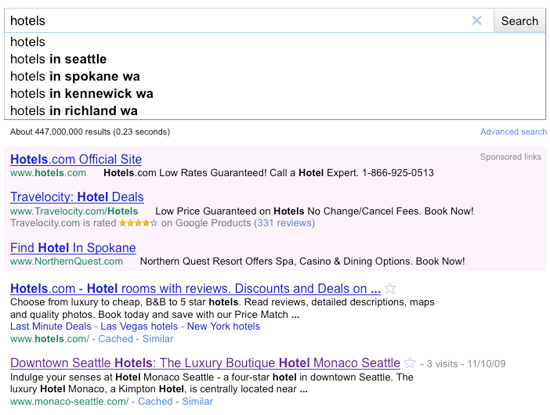Unless you are in a media blackout zone, you will have heard today that Google have started to roll out 'instant search' – a new tool that delivers search results while you are typing the search term. Pause for 3 seconds “mid-keyword” and it will display results based on what you have typed so far. Even just in the last 12 hours, there have been a spectrum of opinions ranging from mild interest to panic. The Zoocha team have been playing with Google Instant and this is our assessment.

Consumer implications
Many will feel this is all a bit of a distraction and could lead to some very confused results. Google is great at finding the most relevant websites for search strings of 2 or more words – now, when searching for “mobile homes” a brief pause in between words will allow a load of totally inappropriate results for mobile phones. In time, this may influence consumer search behaviour by training them to input the most specific word first in order to get relevant results straight away.
However, to look at it as a distraction is actually to miss the point. How many times have you searched on Google only to find no results for what you really want. In the olden days (like yesterday) you would have to retype a more relevant or detailed string of search terms to find what you want. Now, you just pause, check and continue if there are no results that give you what you want. In this respect, it is a truly innovative development that enriches the user experience.
Commercial/Advertiser implications
This is where the real media interest is and it is indeed a very important issue – the bulk of internet advertising budgets are spent on search engine marketing (ppc/adwords) and this is dominated by Google. The biggest implications are:
Search impressions will increase
Lets face it, the fact that this is good for consumers is not the sole reason Google has done this. They make their billions by generating ad impressions from searches and charging advertisers when people click on them. This will certainly boost the volume of impressions they generate (increasing their effective inventory) and will almost certainly increase the volume of clicks. Advertisers will have to decide if they want to increase their budgets to maintain their share of impressions and clicks in their sector. Inevitably, impressions on generic single word search terms will increase the most, which leads onto the second big implication for advertisers.
Adwords campaign structure will need to be reviewed
If, as we predict, there is a disproportionate increase in impressions for single word search terms, advertisers will need to evaluate if their campaign and adgroup structure is optimised. For example, having fairly generic keywords in the same adgroup as more specific long tail search terms could have the result of blowing the budget on less qualified, lower yield traffic. Time will tell, but Zoocha would advise setting up completely new campaigns for very generic, single word terms, so that you can control the budget separately from the more profitable, long tail terms. It will be a learning process, but that is nothing new in the digital environment.
SEO implications
SEO is now big business and so a change of this magnitude is always going to generate 'mixed feelings'. In reality optimising for instant search is not going to be such a radical shift. Understanding which keywords are the most profitable is an iterative process and to an extent SEO best practice will evolve with instant search. It is certainly advisable to check how your keyword 'priority list' performs on instant search under 'normal user' conditions – but then, as good SEO campaign should involve this anyway.
So, how does it rate in the expert opinion of the Zoocha team:
Will – “10 out of 10. Easier to refine searches quickly and if you don't like it, switch it off!”
Dave – “5 out of 10. Its alright… I might get used to it”
Sarah – “7 out of 10. Good for consumers, but could be bad for advertisers”

